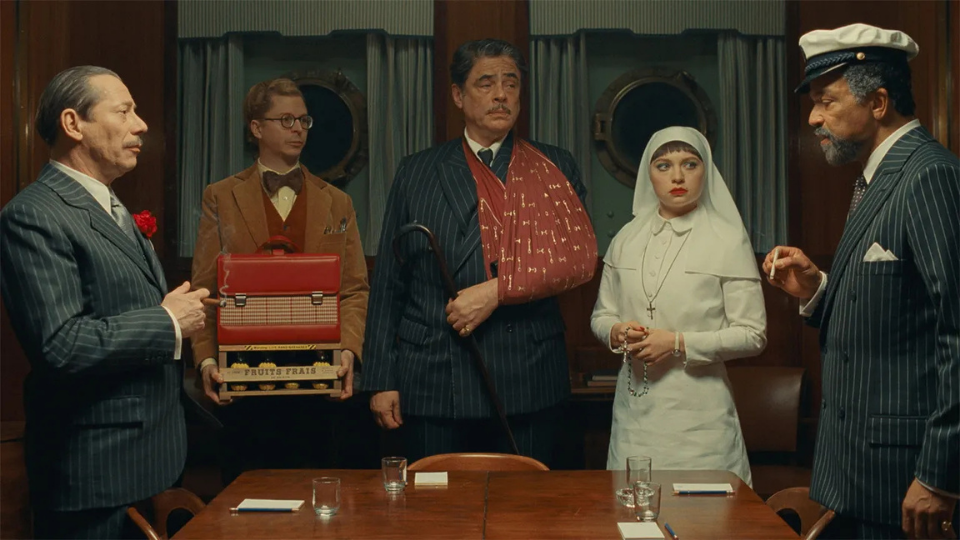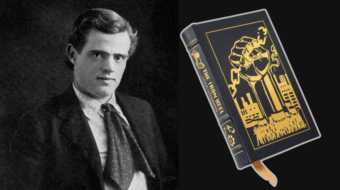
The Phoenician Scheme adds to Wes Anderson’s collection of stylized affective filmmaking, which is another customary masterpiece among his social commentaries, satires, and family dramas set in diorama-seeming sets.
The espionage black comedy is maybe Anderson’s most thrilling film, and the human relationship element is successful as always, because Anderson understands people. He and writing partner Roman Coppola know how to convey human experience through thoughtful comedic writing that shifts effortlessly between broad, droll, and incisive. The jokes are smart and never slow; almost couldn’t be with so many fast-talkers. The analysis of the relationship between governments and industrialists feels especially poignant while the U.S. administrative state is being picked apart by vultures, and the setting is an excellent choice to get an audience to think about the relationship between imperialism and capitalism.
The film follows Anatole “Zsa-Zsa” Korda (Benicio del Toro) and his daughter Liesl (Mia Threapleton), a nun he has pulled out of the convent to be his heir and executor of his will, pending a trial period. At the start of the film, Korda has survived five plane crashes, most assumed to be attempted assassinations, has been widowed multiple times, and has nine sons besides the daughter. He is an arms dealer and a specialist in “clandestine trade agreements,” an eccentric, enigmatic businessman working on a series of infrastructure projects in the divided “Western Near-East” country of Phoenicia.
Opposite Korda, a shadowy multinational group of government leaders or intelligence operatives led by the U.S. (led in operations by Rupert Friend as Excalibur) are out to stop Korda (whose plans alternate between sowing discord and peace at odds with the U.S.-led order), and put the main plot in motion by manipulating the stock market to make building materials more expensive, creating a funding gap in his investment plan (i.e., “The Phoenician Scheme”).
The pious Liesl is apprehensive of Korda but comes on the journey with Zsa-Zsa and his new tutor Bjorn (a Norwegian entomologist played by Michael Cera) to shore up the funding gap, motivated in part to bring her mother’s killer (possibly her uncle Nubar, played by Benedict Cumberbatch) to justice. It would seem trite to say the father and daughter learn to love each other on the trip, but it would not be entirely untrue. The main plot is punctuated and accentuated by grayscale sequences seemingly set in Heaven during Korda’s near-death experiences and dreams, where he reflects on choices in his past and the possibilities in his future. In these, Bill Murray plays God, Murray Abraham a prophet/prosecutor, and Willem Dafoe Zsa-Zsa’s advocate, the knave; with Charlotte Gainsbourg, Antonia Desplat, and Antonia Schröter playing three of Zsa-Zsa’s late wives.
Anderson’s films often rely on ensembles, though this one is focused primarily on following Zsa-Zsa and Liesl, tracking the growth of their relationship and the ways they influence each other to grow and change. It is engaging to watch two strong-willed, estranged people drawn together for an adventure. Zsa-Zsa is used to having his way and people obeying him, Liesl is guided by a faith-based commitment to righteousness. Zsa-Zsa’s fast-talking and Liel’s stern inquiry might make for less compelling pairing in another director’s hands without flourishes of Anderson’s writing in the dialogue executed and the themes explored, plot it’s cut against, and composer Alexandre Desplat’s phenomenal musical instincts (deploying Stravinsky, Beethoven, and his own original compositions inspired by theirs among other pieces), to say nothing of the customary vibrant production design (Adam Stockhausen), art direction (Esther Schreiner, Stephan O. Gessler, et al), set decoration (Anna Pinnock), and costumes.
The Phoenician Scheme is an interesting approximation of history, set in the mid-twentieth century, following ruthless capitalists working to extract profit from a nation already carved up by state and economic interests. Most of them have no tie to or care for stewardship of the land, and all of them arrived at their position by some measure of dirty dealing. Zsa-Zsa’s other nickname is “Mr. 5%,” borrowed from the real-life Calouste Gulbekian, the Ottoman-born British Armenian businessman credited with being the first person to exploit Iraqi oil. Liesl has to convince Zsa-Zsa to pay workers who are going to be forced to build infrastructure projects.
On an interpersonal level, The Phoenician Scheme is about the capacity for human beings to change, and the importance of realizing that there is more value to human life than extracting profit and besting others. Thematically, though, setting the film in an administratively divided section of West Asia feels especially notable amid Israel’s ongoing genocide in Palestine and familiar aggression toward Lebanon and Syria. This is especially true considering the real ancient Phoenicia, while a maritime civilization, was based in modern Lebanon and parts of modern Syria and Israel.
It is also notable that Wes Anderson’s longtime partner is Lebanese costume designer, illustrator, and author Juman Malouf (daughter of author Hanan al-Shaykh), and the film is dedicated to her late father, Fouad Malouf. Even without the escalation in the region over the last two years, Zsa-Zsa, traveling the intersection of North Africa and West Asia, greeting his investors with hand grenades as gifts (because bullets were more expensive) while dodging assassins, cuts a memorable figure.
As a man who built his fortune after being rejected by his wealthy father, who kept his own children at a distance before Liesl’s intervention, who expects obedience and to be able to fiddle with contracts after agreements have been struck, he could stand in for President Donald Trump or the uber-wealthy Elon Musk. But these traits are perhaps typical, culturally and personally, of the men who own the world. The capacity and desire for moral improvement are apparently rarer. Seldom do we see the nature of a massive multinational business deal change for the better.
Anderson has a distinct style that is frequently associated with “twee,” a phrase I find inadequate for the technical mastery of actual and approximate dioramas, and the earnestness and intelligence of the character portrayals, which is complemented rather than undermined by the assumed quirkiness.
Where his previous film, Asteroid City, is about art, The Phoenician Scheme is about wealth. Both films are about legacy and are explicit in their critiques of the Western status quo, but where Asteroid City was at times about how the military-industrial complex exploits science and scientists, The Phoenician Scheme is about how the status quo depends on and reinforces the schemes of rich men. It isn’t fixated on the necessity of structural change to disrupt the corrupt world order, but it offers that we can and should do better, that positive morality is worth aspiring to, and that family and community have value.
We hope you appreciated this article. At People’s World, we believe news and information should be free and accessible to all, but we need your help. Our journalism is free of corporate influence and paywalls because we are totally reader-supported. Only you, our readers and supporters, make this possible. If you enjoy reading People’s World and the stories we bring you, please support our work by donating or becoming a monthly sustainer today. Thank you!










